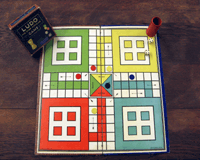Indian Game: Ludo
In 1896, a westernised version of Pachisi was published in England under the name Ludo (Latin for "I play"), a game which has been popular in that country ever since. The game however, is a highly simplistic version of Pachisi for children. The author has evidence that shows that a game called "Puchese" was published at the much earlier date of 11 April 1862 in England.
There is another less well-known descendent of Ludo called Uckers. The OED's earliest reference to this game sums it up well: "1946 J. Irving Royal Navalese 180 Uckers. A game very similar to Ludo, and played on a large board by teams of three or four men. "

Number of Players
2, 3 or 4 players.
How to Play Ludo
- Each player places their pieces in 'prison' (or call it 'work' if you prefer).
- Each player rolls the dice and the player with the highest count starts first (or you can just choose someone to start first if you prefer).
- From there, the players play in a clockwise order.
- Player must roll a 6 to get a piece 'out of prison' to the colored box right outside of their prison. This means that you can not get out of prison until a 6 is rolled, and rolling a 6 gets you just outside of the prison walls.
- After getting out of prison, follow the arrows to go around the board until you come back to your 'colored path'.
- Each time the dice is rolled, move any one of your 'out-of-prison' pieces that number of spaces in the direction indicated by the arrows.
- If a player land on a square containing another player's piece, the other player's piece goes back to prison.
- Each time the dice is rolled, the EXACT number of spaces must be moved. So for instance, if you are on your 'colored path towards home', you can not use a higher number to get home. So, if you need 3 spaces to get home, you need to roll a 3, or a 2 and a 1; rolling a 4, 5, or 6 doesn't allow you to move this particular piece home, but of course, you can move one of your other pieces that is out of prison.
- The first player that gets ALL their pieces home first, WINS. The game can end there, or the other players can continue until most of them have all their pieces.
